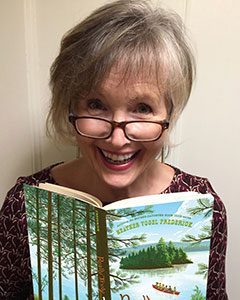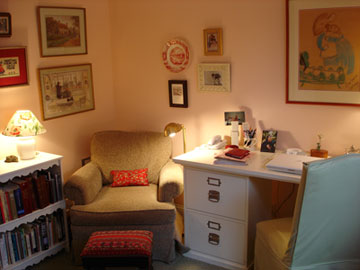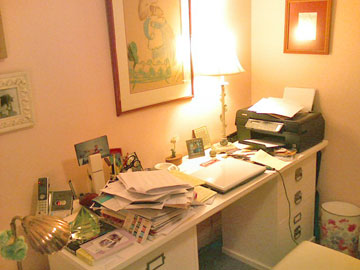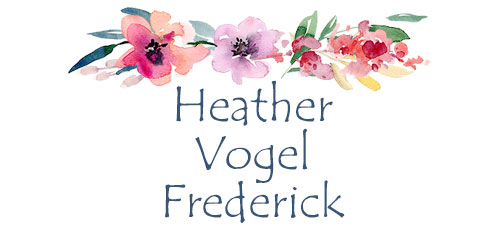Q: Where do you get your ideas?
A: Target. Just kidding! This is the #1 question all writers are asked, and the real answer is—absolutely everywhere. Writers have a different set of radar than the rest of the world. At some level, we’re always scouting for story ideas. We overhear things (I’m a shameless eavesdropper), see things, read things, experience things, smell things, remember things — and then we gather them all up and file them all away for future use. I have notebooks filled with interesting names, snippets of conversation, random images, and so on. It’s all grist for the mill.
(By the way, I actually did get an idea at Target once—in the men’s underwear section! It was right around Valentine’s Day, and there was a huge display of heart-covered boxer shorts. It occurred to me that a pair of those would likely be the most embarrassing thing in the world for a fifth grader to be caught wearing, and so I put them on one of the class bullies in Spy Mice: The Black Paw. You’ll have to read the story if you want to find out what happened to him…)

Q: Will there be more Mother-Daughter Book Club books?
A: Mother-Daughter Book Camp is the seventh and final book in the series. Saying goodbye to stories and characters we love is hard, I know! It’s just as hard for a writer as it is for a reader. But I have other stories to tell and other characters to bring to the page. If you’re a Mother-Daughter Book Club fan, you might enjoy reading my Pumpkin Falls mysteries (Absolutely Truly, Yours Truly, and Really Truly), as a few familiar faces put in cameo appearances here and there.
Q: Have you always wanted to be a writer?
A: Yes. I fell under the spell of the written word early, when my father read aloud to my sisters and me every night before bed. Ever since I was old enough to understand that books didn’t just magically appear on library and bookstore shelves, but that real live people called authors wrote them, I’ve thought, “That’s the job for me.”
Q: If you weren’t a writer, what would you be?
A: A librarian or bookseller, most likely. I can’t imagine a life that didn’t have something to do with books. I briefly considered being an Egyptologist—I grew up in New England, and Boston’s Museum of Fine Arts has a mummy exhibit that fascinated me when I was young, plus I loved Zilpha Keatley Snyder’s book The Egypt Game. I was also fascinated with all the spy shows on TV back then—Mission: Impossible, The Man from U.N.C.L.E., I Spy, and my favorites, The Avengers and Get Smart. And of course there were all the James Bond movies to boot! Espionage seemed so glamorous to adolescent me, who wasn’t very glamorous alas (and I have the pictures to prove it). So becoming a spy was quickly crossed off my list of possible future careers.
Q: Do you have any pets?
A: Not at the moment. But you can read a story about the first dog I ever had by clicking here. We used to have three chickens, too, but they’ve retired. You can read a funny story about Pixie, our littlest chicken, by clicking here.
Q: What are your interests and hobbies?
A: As you’ve probably already guessed, my favorite pastime is curling up with a good book. I love spending time outdoors too, though. I love to walk and hike. Swimming is my favorite form of exercise and you can usually find me in the local pool several mornings a week, swimming laps. Let’s see, what else? Road trips! I’ll happily go on a road trip anytime, anywhere, with anyone. I love to garden, and I grew roses when we lived in Oregon, but only the old-fashioned heirloom kind that smell fabulous. Why would anyone grow roses that don’t smell like roses? Now that I live in a city apartment, I mostly admire other people’s gardens, and happily tend a few potted plants on our balcony. I’m an avid knitter, and I always have a project or two going. I also love to bake. I make excellent cookies and scones, and every week I make bread from scratch — something I’ve done ever since my grandmother taught me how when I was 12. And one of my favorite things in the world to do is pick berries and make jam. Homemade toast and jam — nothing beats that!


Q: What’s your writing process like?
A: I am a morning person, and a typical day for me starts early. Sometimes as early as four or five a.m., if I have a story percolating and the ideas are flying thick and fast. Plus, I have a “day” job, as we writers call it, working in a museum, so those early morning hours before I need to turn my attention to that work are pure gold. By the end of the day, I’m usually too tired to think about writing. Over the weekend, I’ll squirrel away some creative time as well.
I almost always write on the sofa in my office at home, or out on our apartment’s small balcony. I rarely sit at my desk. Once in a while I’ll write at the library or in a coffee shop for a change of pace (and a great decaf mocha). I actually find I can write really well at airports while waiting for planes!
First drafts are the hardest for me. I’d rather do just about anything than write a first draft, and I have to be quite stern with myself, so that I stay put in my chair. Once I have something—anything!—down on paper, things start to pick up speed. I absolutely love to revise. I like having something to work with, something I can take apart, rearrange, and polish. Polishing is so satisfying! I love that feeling of what the famous editor and writer William Maxwell once called “the happiness of getting it down right.” The very best part of the writing process for me, though, is when the words are flowing so well that I fall into the slipstream of the story and completely lose track of time. That’s pure undiluted joy.
Q: What do you do when you get stuck?
A: Ah yes, writer’s block. It happens to us all. To be honest, I simply don’t put up with it. I’ve been writing for a living one way or another for over 30 years now, so writing is my job. I wouldn’t get cashier’s block if I was a checkout clerk in a grocery store, would I? So I refuse to succumb to writer’s block. It may rear its head occasionally, but I’ve found ways to pull the wool over its eyes—I’ll go for a walk, maybe, or do the dishes. Knit for a bit. Bake something. Busying the hands often frees the mind to work out whatever snarls have arisen. If nothing else works, I’ll skip to a different part of the story and tinker with that instead. Just something to keep the wheels turning. If I’m persistent, eventually the logjam breaks and things start to flow again.
Q: Do you have any advice for aspiring writers?
A: Read. Write. Read some more. Write some more. Repeat.
There are no shortcuts. Just as it takes time for, say, a dancer to be ready for the stage, or for a lawyer to be ready to argue a case in court, or for a violinist to play with the symphony, so it takes time to grow a writer. Hours and days and weeks and months and often years go into growing a writer. Be patient. Persist. Have faith in yourself.
Don’t worry if you stumble and fumble around, or if some of the things that you write go nowhere but the trash. That’s OK. I don’t know about you, but I learn best from my mistakes. Thomas Edison once said, “I have not failed … I have successfully found 10,000 ways that will not work.” Becoming a writer is a lifetime’s commitment, really. It takes humility, and perseverance, and a hunger for and love of the work itself that keeps you moving forward when all else fails.
Keep a notebook handy. You never know when inspiration will strike, and it’s good to have a notebook nearby to jot ideas down, otherwise they tend to vanish. (Trust me, I speak from experience.) I stash them about liberally—in pockets, glove compartments, backpacks, purses, junk drawers.
Above all, have fun. Don’t put too much pressure on yourself to get something published right away. Just relish the process and allow yourself the time you need to grow as a writer. If writing isn’t a joy, you’ll end up setting it aside. Keep it a joy.
Q: How can I get published?
A: Polish your manuscript until it glows. Attend writing conferences to learn the ropes, gain inspiration and encouragement, network, have your story critiqued, meet agents and editors, and more.
If you write for young readers, I highly recommend that you check out the Society of Children’s Book Writers and Editors—they offer national conferences as well as regional conferences in just about every corner of the United States and in many parts of the world with workshops on just about every aspect of the craft and business of writing and publishing. If you write for adults, google “writing conferences” to see what’s available near you.
Q: Will you read my story if I send it to you?
A: Alas, I just don’t have time. I have my hands full juggling a full-time job and my own deadlines these days! I’ll cheer you on from afar, though.
Q: Can you autograph my book?
A: Absolutely. If it doesn’t look like I’ll be appearing at a bookstore near you anytime soon, you can send me your book along with a mailer with return postage on it, and I’ll be happy to sign it for you and send it back.
An autographed bookplate is another option—if you’d like one of these, send me an email over on my contact page, tell me which book you want it for, and I’ll sign one and mail it to you. Be sure and include your snail mail address!
Q. Will you donate an autographed book for our fund-raiser?
A. There are so many worthy causes I’d love to support, but unfortunately, I get so many requests for donations that I simply can’t accommodate everyone. What you may not realize is that authors receive a limited number of copies of their own books, and after those have run out we have to buy them just like everybody else. By the time I’ve shared my author copies with family and friends, I rarely have any left over for donations.
I’m always happy to send along autographed bookplates for your fund-raiser, though. See the instructions in the question above if this option is of interest.

